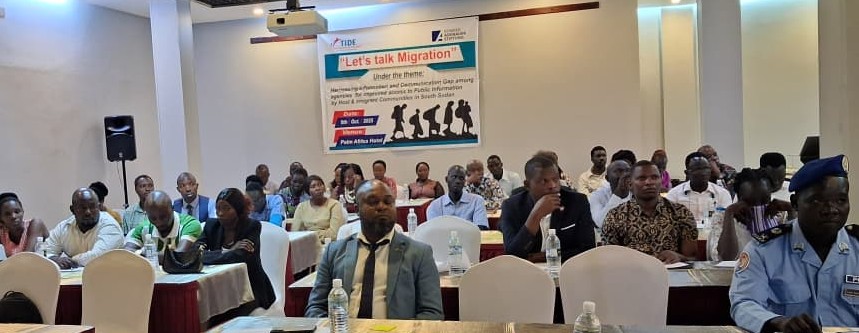
Government officials have called on migrants living in South Sudan to respect the country’s laws and avoid activities that may lead to conflict with authorities.
The Director General for Nationality, Passport, and Migration, Maj. Gen. Elia Kosta Faustino, delivered the message while addressing participants drawn from government institutions, civil society organizations, international partners, and migrant community representatives.
“Migrants living in South Sudan must respect the laws of this country to avoid getting into conflict with the authorities,” said Maj. Gen. Kosta.
“At the same time, our citizens should continue to show kindness and provide necessary support to ensure migrants live peacefully among us.”
The appeal was made during a one-day Inter-Agency Migration Dialogue held in Juba on Wednesday.
Maj. Gen. Kosta emphasized that respect for the law is essential to maintaining harmony between migrants and host communities, noting that mutual understanding and cooperation contribute to peace and social stability.
He also raised concerns over the link between insecurity and human trafficking, warning that persistent instability in parts of the country has created a pathway for traffickers and illegal migration networks.
“We are strengthening border management and coordination with partners to address the movement of undocumented persons and prevent criminal exploitation,” Kosta added.
The forum, organized by Talent Initiative Development (TIDE) in collaboration with Konrad Adenauer Stiftung (KAS), provided a platform for open discussion on migration management, security challenges, and social integration.
Robert Antipas Guya, Program Manager at TIDE South Sudan, said the dialogue aimed to bridge communication gaps between the government, host communities, and migrant populations.
“This day is not for me to talk, but to open a space for you to discuss very important issues,” Guya told participants.
“Migration has become a global issue, not only in South Sudan but all over the world. In this room, we have different nationalities, refugees, asylum seekers, and other migrants — who must find ways to coexist peacefully,” he added.
Guya recalled that during an earlier dialogue under the project Let’s Talk Migration, participants highlighted issues such as employment barriers, corruption risks, illegal migration, and border security threats.
For Guya, the follow-up meeting in Juba was designed to explore practical solutions with key institutions, including the Directorate of Immigration, UNHCR, and IOM, to promote safe, regulated migration.
“We appreciate the commitment of Maj. Gen. Elia Kosta for attending despite his busy schedule, even on Uganda’s Independence Day,” Guya said. “It shows the government’s willingness to listen and engage.”
Anisha Alinda, Program Manager for Konrad Adenauer Stiftung (KAS) in South Sudan and Uganda, praised the government’s active participation, saying dialogue remains key to addressing migration challenges in the region.
“From his remarks, it is clear that the Director General values dialogue and democracy,” Alinda said.
“When decision-makers and those affected by migration challenges come together, real solutions can emerge.”
Alinda noted that South Sudan’s migration story is often told from the perspective of refugees fleeing abroad.
However, the country also plays an important role as a host and transit nation, receiving migrants from Kenya, Burundi, the Democratic Republic of Congo, Somalia, and Eritrea.
“When we talk about migration, the focus often shifts to refugees in Uganda, but South Sudan also hosts asylum seekers and immigrants,” she added.
“This dialogue helps us align law and reality — what is written in policy versus what is experienced on the ground.”
South Sudan currently hosts thousands of migrants and refugees from neighboring countries such as Sudan, Ethiopia, Uganda, and the Democratic Republic of Congo, many of whom fled conflict or economic hardship.
However, weak border management and limited legal awareness have led to cases of illegal migration, human trafficking, and employment exploitation.
The government, through the Ministry of Interior and its partners, continues to strengthen migration governance through improved policy coordination, public awareness, and legal enforcement to promote peaceful coexistence and protect human rights.

